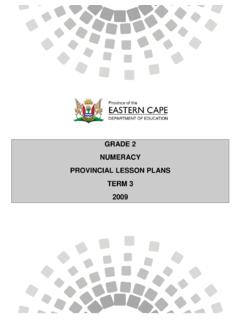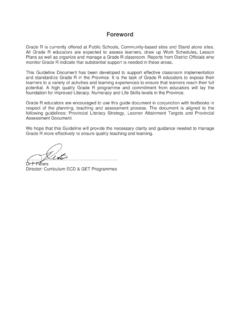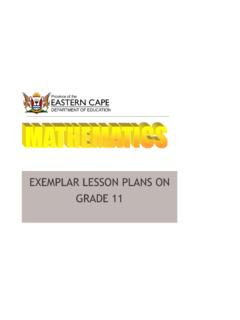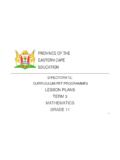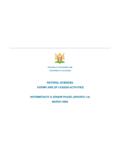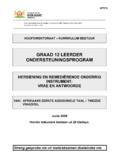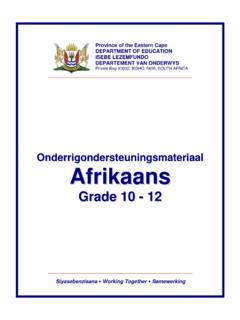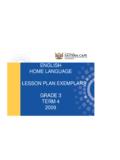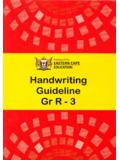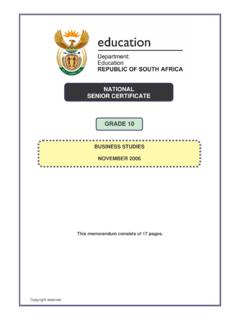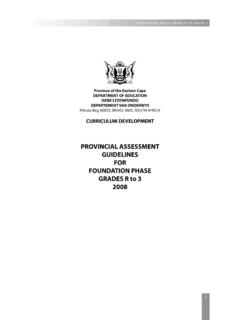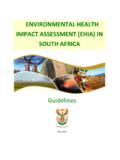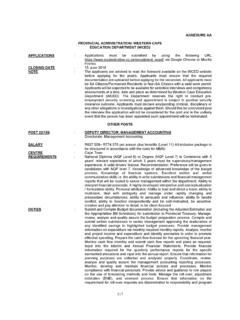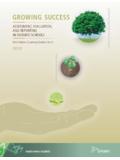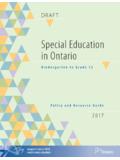Transcription of PROVINCIAL ASSESSMENT GUIDELINES NATURAL …
1 Province of the Eastern CapeDEPARTMENT OF EDUCATIONISEBE LEZEMFUNDODEPARTMENT VAN ONDERW YSPROVINCIAL ASSESSMENT GUIDELINESFORNATURAL SCIENCESINTERMEDIATE & SENIOR PHASESEPTEMBER 20071 PREFACE The Eastern Cape Department of Education, Curriculum Chief Directorate in collaboration with the district curriculum personnel, provincialised the National ASSESSMENT GUIDELINES for NATURAL Sciences with the purpose of increasing the capacity of teachers to have a clear picture on the process of ASSESSMENT in general and on continuous ASSESSMENT in the learning area in particular. This process has been informed by the Policy on ASSESSMENT of February 2007, National ASSESSMENT GUIDELINES of 2007, the Teacher s Resource Book for Senior Phase of 2005 and the National Curriculum Statement (NCS) in NATURAL Sciences.
2 Critical engagement with the document is encouraged. W e invite you to be as rigorous and as vigorous as you can and have complete faith in your professionalism as you implement the NCS. W e urge you to consult this document in the ASSESSMENT process of learners. W e also invite your suggestions for improving the document. 2 TABLE OF CONTENTS NoCONTENT PAGE 1 INTRODUCTION 3 2 NATURAL SCIENCES AT A GLANCE 3 3 LEARNING OUTCOMES& ASSESSM ENT STANDARDS IN NATURAL SCIENCES 44 CONTINOUS ASSESSMENT (CASS) IN NATURAL SCIENCES 55 PLANNING FOR ASSESSMENT 7 6 ASSESSMENT TASK FOR THEPROGRAMME OF ASSESSMENT IN NATURAL SCIENCES 137 FURTHER EXPLANATION OF ASSESSMENT TASKS IN NATURAL SCIENCES 148 MODERATION 20 9 STAGES OF MODERATION 20 10 MODERATION PROCEDURE 21 11 EXEMPLER OF NATURAL SCIENCE PROJECT 26 12 LESSON PLAN EXEMPLERS 32 13 STEPS IN DEVELOPING RUBRICS 37 14 ANNEXURES 39 31.
3 INTRODUCTION This document serves to highlight issues on ASSESSMENT in NATURAL Sciences in the Intermediate and Senior Phase. Emphasis is given to school based ASSESSMENT . The document should be read/ utilized in conjunction with NATURAL Sciences National ASSESSMENT Guideline document. Therefore, the purpose of this document is not to repeat any part of the national ASSESSMENT GUIDELINES which are based on the ASSESSMENT Policy of February 2007, but merely to expand on issues not clearly stated yet crucial for micro planning of learner ASSESSMENT . 2. NATURAL Sciences at a glance The NATURAL Sciences offers a particular way of understanding the world we live in.
4 The NATURAL Sciences Learning Area differs from other Learning Areas because of: the way in which information is gathered and interpreted; the way in which information is verified before general acceptance; the acknowledgement of the limitations of scientific enquiry; and the domain of knowledge that is covered. The NCS is designed in such a way that by the time learners have reached the Senior Phase, they will have experienced an integrated approach at Foundation and Intermediate Phases, in which Science is related to a number of other Learning Areas and various curriculum policies. At the senior phase level, learners are gradually introduced to aspects in science disciplines; for example, Life Sciences, Physical Sciences, Agricultural Sciences and Geographical Sciences, through an integrated as well as diversified teaching 4and learning of knowledge strands / content areas.
5 The approach at this level presents a continuum throughout the years, thereby allowing a sm ooth transition to science at Further Education and Training level, as well as the world of work. 3. NATURAL SCIENCES LEARNING OUTCOMES AND ASSESSMENT STANDARDS LO 1: SCIENTIFIC INVESTIGATIONS AS:Plans investigations:Identifies factors to be considered in investigations and plans ways to collect data on them , across a range of : Conducts investigations and collects dataConducts investigations, collects and records inform ation based on the investigations AS: Evaluates data and com m unicates findings:Considers the extent to which the conclusions reached are reasonable answers to the focus question of the investigation.
6 LO 2 CONSTRUCTING SCIENCE KNOW LEDGE AS: Recalls m eaningful inform ation:At the m inim um , recalls procedures, processes and complex facts. AS: Categorizes inform ation:Applies classification system s to fam iliar and unfam iliar objects, events, organism s, and m aterials. AS:Interprets inform ation:Interprets inform ation by translating tabulated data into graphs, by reading data off graphs and by m aking predictions from patterns. AS:Applies knowledge: Applies conceptual knowledge to som ewhat unfam iliar situations by referring to appropriate concepts and processes 5LO 3: SCIENCE SOCIETY AND THE ENVIRONMENT AS: Understands science as a hum an endeavour:Identifies ways in which people build confidence in their knowledge systems AS: Understands sustainable use of the earth s resources:Identifies information required to make a judgment about resource use.
7 In the NATURAL Sciences Learning Area the process of investigation is central and constitutes an integral part in planning the achievement of all three Learning Outcomes. Although all three Learning Outcomes (LOs) are equally weighted, Learning Outcome 1 is naturally integrated with other two Learning Outcomes during the process of teaching and learning. Hence, the teaching and learning of science involves the development of a range of process skills that are indispensable to man s quest to understand the world. The process of investigation in the classroom is the same as the one conducted in the scientist s laboratory. 4. CONTINUOUS ASSESSMENT (CASS) IN NATURAL SCIENCES Continuous ASSESSMENT comprises of two different activities: Informal daily ASSESSMENT activities and formal assessments.
8 Continuous ASSESSMENT through informal daily ASSESSMENT and the formal programme of ASSESSMENT should be used to: Develop learner s knowledge, skills and values; Assess learner s strengths and weaknesses; Provide additional support to learners; Motivate and encourage learners; Revisit or revise certain sections of the curriculum. 6In Grades 4-8 all ASSESSMENT of the National Curriculum Statement are internal and make up 100% of the final mark for promotion. In Grade 9 continuous ASSESSMENT forms 75% and CTA 25% of the final mark for promotion. INFORMAL DAILY ASSESSMENT The daily ASSESSMENT tasks are planned teaching and learning activities that take place in the classroom.
9 Learners progress should be monitored during learning activities. This can be done through question and answer sessions, short ASSESSMENT tasks completed during the lesson by individuals, pairs or groups or through homework exercises. The result of the informal ASSESSMENT tasks are not formally recorded unless the teacher wishes to do so. However, teachers may use the learners performance in these tasks to provide verbal or written feedback to learners, the school management team and parents. This is particularly important if barriers to learning or poor levels of participation are FORMAL ASSESSMENT In addition to daily ASSESSMENT , teachers should develop a year long formal programme of ASSESSMENT for each grade.
10 As the National ASSESSMENT GUIDELINES (2007) suggest, formal ASSESSMENT is carried out to obtain reliable records that will enable the teacher to determine a learner s overall competence in the Learning Outcomes and ASSESSMENT Standards. The formal ASSESSMENT should enable the teacher to make informed, valid judgments about various levels of performance and learner competence in NATURAL Sciences. Formalassessment tasks should comprise of various forms of ASSESSMENT and assess a7variety of skills and knowledge suggested in the ASSESSMENT Standards in the PLANNING FOR ASSESSMENT An important part of planning is to decide, at the Learning Programme Level, what type of ASSESSMENT will be used and on the range of tasks to be assessed.
